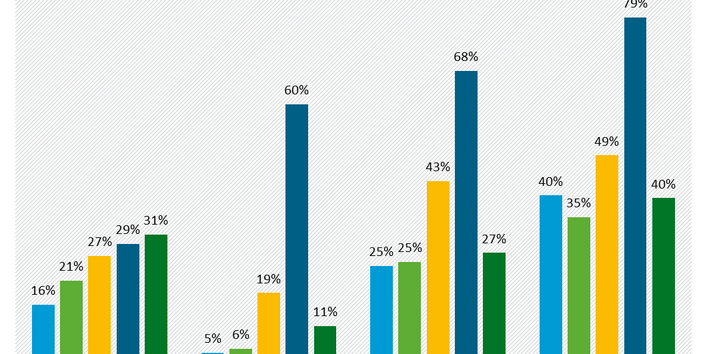Majority of German cities and municipalities are faced with the challenges of the climate crisis
On 1st July 2024 the Climate Adaptation Act (Klimaanpassungsgesetz) came into effect. For the German Länder, this forms a legislative framework to present a climate adaptation strategy and to ensure that the local authorities provide climate adaptation plans. A representative national survey on behalf of the German Environment Agency, the first on this topic, now shows that a majority of the surveyed local authorities are actively engaged with the topic of climate adaptation. Measures on climate adaptation have already been implemented by over 40 percent of the local authorities. Additionally, just under 40 percent stated that they were planning appropriate measures.
Federal Minister for the Environment Steffi Lemke commented “The consequences of the climate crisis bring a wide range of challenges to different regions of Germany. As a result, the local authorities play a key role. They know the local conditions best and can therefore take appropriate measures to protect the population. The Climate Adaptation Act creates a strategic framework for proactive climate adaptation at all levels across Germany. The experts from the Climate Adaptation Centre (Zentrum Klima-Anpassung) and our funding guidelines support local authorities in effectively preparing for climate risks. The results of the survey clearly show that most local authorities have already begun to prepare for the task of climate adaptation and that further support is needed for nationwide preparedness.”
In the study commissioned by the German Environment Agency, the differences in adaptation progress among the municipalities is made clear: 12 percent of local authorities state that they already have a climate adaptation plan, 41 percent have implemented specific measures for climate adaptation. Over 30 percent of the local authorities choose climate-adapted plants, determine limits for building development, renaturalise water bodies, create open water areas and inform the population about dangers and precautionary protection measures.
Independent cities are at the forefront of climate adaptation and are more comprehensively organised than smaller municipalities or districts. In more than half of the independent cities there is already a climate adaptation manager. This is only the case in 4 percent of cities and municipalities with less than 20,000 residents. The national average is 12 percent. Lack of staff (80 percent) and lack of financial resources (73 percent) are the most significant obstacles to planning or implementing climate adaptation measures. Federal Minister for the Environment Steffie Lemke notes “Climate adaptation is about the protection of health, risk precautions and prosperity. In addition to a legal basis, we also need sufficient financial resources. For long-term financing, I am proposing a new Joint Task of climate adaptation for the Federation and Länder. This would require a constitutional amendment, enabling the government, together with the Länder, to invest more money into municipalities.
Dirk Messner, President of the German Environment Agency, states “Adaptation to the climate crisis is one of the central tasks of the coming years and decades. We therefore need a joint task (Gemeinschaftsaufgabe) that is rooted in the German constitution, in order to ensure that local authorities are well equipped with staff and financial resources".
Further Information
The study “Local Authority Climate Adaptation Survey 2023” (Kommunalbefragung Klimaanpassung) is the first representative national survey about municipal climate adaptation progress. It was carried out in Autumn 2023 on behalf of the German Environment Agency (UBA) by the Institute for Social-Ecological Research (Institut für sozial-ökologische Forschung), SOKO Institute for Social Research and Communication (SOKO Institut für Sozialforschung und Kommunikation) and UP Transfer GmbH at the University of Potsdam. Overall, 4,691 districts, cities, municipalities and municipalities associations were invited electronically or by post to take part in the survey. 1,062 local authorities across all Länder took part in the survey. The return was over 22 percent. Independent cities and districts answered the questionnaire disproportionately frequently (approx. 65 as opposed to 45 percent). The lowest return was from municipalities associations with just over 16 percent. Small and medium-sized municipalities make up a large proportion of the sample.

